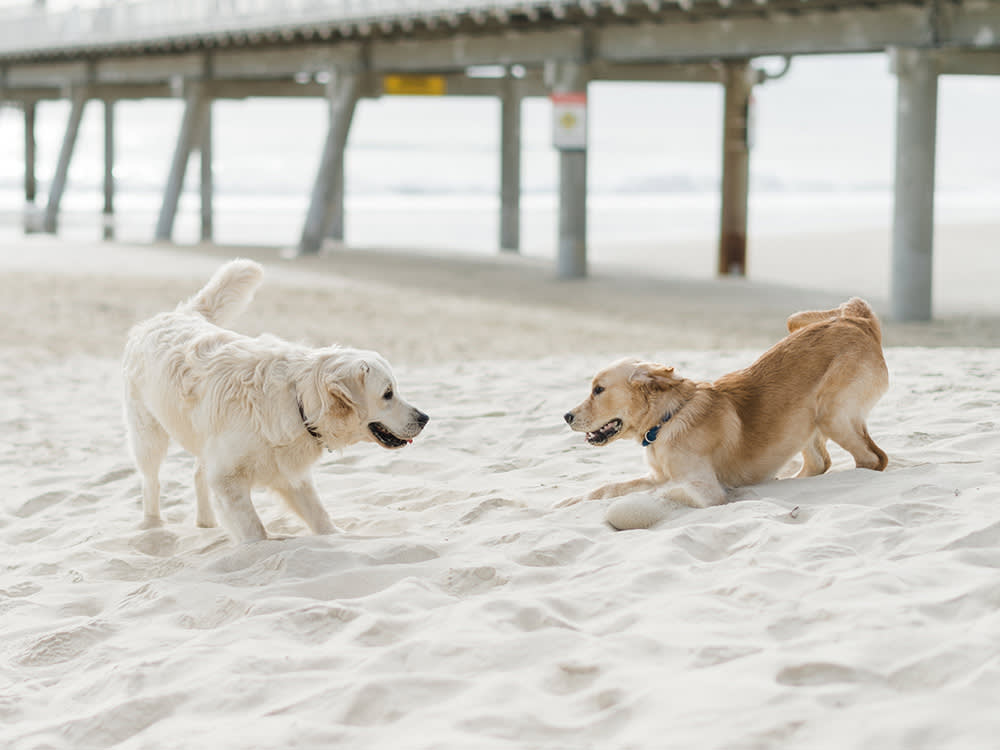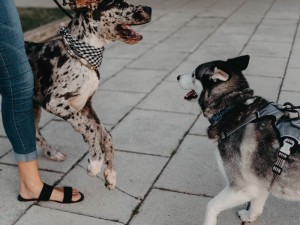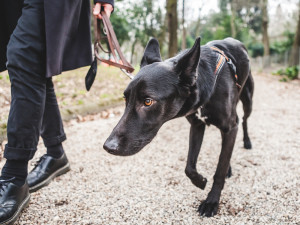After a Fight, Do Dogs Forgive?
Studies have shown why some dogs choose to be friendly after a fight

Share Article
Are dogs the forgiving type? They’re social animals, so it stands to reason that they tend to cooperate and try to minimise conflict. But what happens when there’s a small bust-up or a fight? While they’ll sometimes just walk away and leave each other alone, other times, they’ll go through a process of reconciliation and make up after the fight.
Reconciliation has been studied in a lot of species – mostly primates – but researchers continue to debate how closely these animal reconciliation behaviours approximate forgiveness, apologies and other human conflict-resolution concepts.
How do dogs go from brawling to getting along again, and why do they bother? That’s what a team of researchers at Butler University wanted to answer. Professor Melissa Shyan-Norwalt, PhD, a scientist researching dog reconciliationopens in new tab, has seen cases involving dogs who have bitten their people and then acted ‘apologetic’, in what seems like a plea for forgiveness. (Other behaviourists, including me, have also seen this phenomenon.) But do dogs forgive other dogs, or do they hold grudges?
Theories on dog forgiveness
In this study, researchers watched dogs interacting with one another at a two-acre dog park over eight months to learn more about why dogs might forgive after a fight. During that time, they observed interactions between 177 dogs; most dogs were not long-term friends but strangers or only slightly familiar with one another. As you can imagine, there were plenty of conflicts at the park. In reviewing 14 minor fights (with no injuries), the study aimed to test three potential reasons why a dog might choose to forgive.
1. To restore relationships
One reason why dogs might forgive is to restore a relationship. In social animals, individuals need each other for food, safety, warmth and all of the other benefits of group living; after a conflict, they need to restore the relationship to good terms.
2. To determine status
Another hypothesis is that reconciliation would restore the social order and clarify each individual dog’s status. This suggests that lower-status animals must act deferentially to others in order to reconcile with them.
3. To reduce stress
The last theory is that forgiveness reduces stress and uncertainty around potential future conflict and aggression. By reducing uncertainty, stress levels decline.
Forgiveness brings stress relief
In the end, the study found only one theory matched in this context: uncertainty and stress reduction best explained the behaviour of the dogs. They found that both victims and aggressors showed reconciliation behaviours towards one another after a conflict. Both tended to spend more time together after the conflict regardless of if they had an existing relationship.
While it seems dogs do forgive after a fight, there’s still a lot more to learn about reconciliation in dogs. In some multi-dog households, it doesn’t always work out. Shyan-Norwalt has observed dogs in the same family who did not reconcile but instead separated after every conflict. She points out that even when dogs do reconcile, “it’s important to remember that reconciliation reduces the risk of repeat aggression only in that immediate situation. It does not predict future behaviours. It’s not an apology – it’s ‘that situation is over, let’s move on.’”

Karen B. London, PhD, CAAB, CPDT-KA
Karen B. London is a certified applied animal behaviorist (CAAB) and certified professional dog trainer (CPDT) who specializes in working with dogs with serious behavioral issues, including aggression. She has written for a variety of magazines including The Bark, Clean Run, and the APDT Chronicle of the Dog, and has published in scientific journals including Behavioral Ecology and Sociobiology, Ethology, Ecology, and Evolution, the Journal of Insect Behavior, and Insectes Sociaux. She is the author of seven books about dog training and canine behavior, including the forthcoming My Dog's Mystery Adventure: And Other Stories From a Canine Behaviorist and Dog Trainer.
Related articles
Male Vs Female Dogs: Are There Any Real Differences?
World-renowned behaviourist Patricia McConnell explains
![Great Dane puppy and Husky meeting on leash out side.]()
Understanding Reactivity and Aggression in Dogs: Two Very Different Things
Apparently even experts have a hard time defining these terms
![Shy black dog walking with owner at the park.]()
How to Help an Anxious Dog Conquer Their Fears
Six animal behaviourists share pro tips for boosting the confidence of a fearful dog
![Russian Toy Terrier with ears back]()
9 Reasons Why Dogs Put Their Ears Back
Here‘s how your dog’s ears can clue you into how they’re feeling



